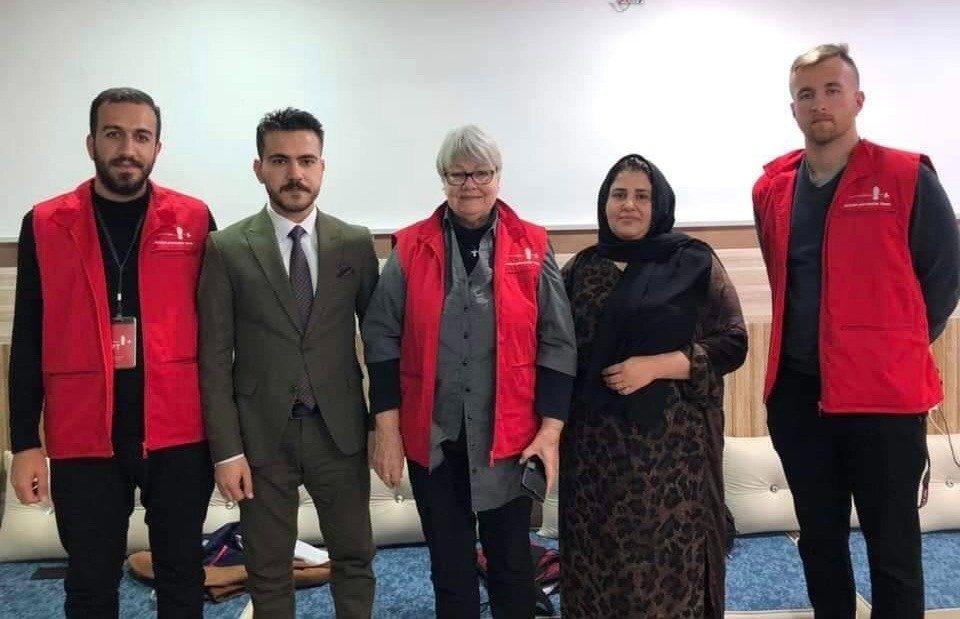Reflection: The same oppression as in the past…
by Marianne Kronberg
The National Museum Amna Suraka – also known as ”the Red Museum,” is supposed to show the history of the terror and oppression during Ba’athist times, during the time of the Iraqi Republic - not the least, during the reign of the dictator Saddam Hussein. But is the oppression and violence history? The answer can only be no! What happened in the past happens now every day in Iraqi Kurdistan.
Some time ago I visited the museum. As I was walking around the prison building, reading the texts and descriptions of the different rooms and cells, I felt depressed. Not only for the dreadful killing, violence and torturing in the past. Even more because of all the witnesses I have heard in the last month, that I spent with CPT here in Iraqi Kurdistan. Witnesses testify about almost unbelievable conditions in the prisons today; torture, injustice, and confessions under threat. Just as it is shown as history in the museum.
”This room was specified to detain men. It’s built on a 57 square-meter area, but the number of detainees was often reaching 110 people” (National Museum Amna Suraka, room number 5).
I hear the voice of one of the witnesses, one of the detained independent journalists that was released from prison some weeks ago. A man who has spent one and a half years in prison, including 52 days in solitary confinement, who has been tortured, and still bravely witnesses about the conditions: “After the time in solitary confinement, I was moved to another cell. When I saw it, I almost wanted to go back to solitary confinement. The new cell was about 50 square-meters, and there were 130 people in it. One day the head of Parliament came, and we were reduced to 100 people during his visit…”
Many people we have met have witnessed this. It happens in Asaish (Kurdish security forces) prison. The cells were so crowded that the guards had to push the people in the night, using some kind of board, to force the men to lie down even closer to each other.
In the museum there was a special department for detaining women. Among them were pregnant women who delivered in the prison. Their babies and children were used as means of torturing them i. e. they isolated their children to force them to admit to committing crimes that they never did.
And I remember the words of another detained man, also one of the Badinan prisoners, when he told us that the security guards had said that if he didn’t confess, they would rape his wife. And he realized they would do it. So he confessed to a crime he never did. Later in the trial, he said in the court how he had been forced to confess under threat.
”The area of this room is 16 square meters. It was particularized for beating the victims according to the will of the security officers…” (National Museum Amna Suraka)
The story from one of the witnesses, one of the detained independent journalists, gets into my mind: “I was blindfolded and handcuffed. Many people beat me. After the torture, they started to interrogate me. They pointed a gun at me and said I might be tortured again. They continued beating me. It was Asaish.”
He was tortured both physically and mentally. The only way he could defend himself was with spoken words. Later they wanted him to make a confession on a video, saying that he had not been tortured. He answered “Yes,” when they asked him if he had been beaten. It was deleted from the video.
History repeats! I don’t know how many times I have heard the same message from different families, different victims, and different people. In the past, it was Saddam Hussein.
Today it’s Kurds against Kurds. Why?
And I can only agree. Why?
I felt depressed when I was in the museum, mostly because I recognized so much from what is happening today, all the stories I have heard from innocent, detained people. But my strongest feeling is gratitude. Instead of feeling depressed, I am hopeful. Hopeful because of all the brave people I have met defending human rights, defending the freedom of speech, and defending democracy. Hopeful because of the spirit of all these innocent people, not giving up!
They are worth all our respect.

